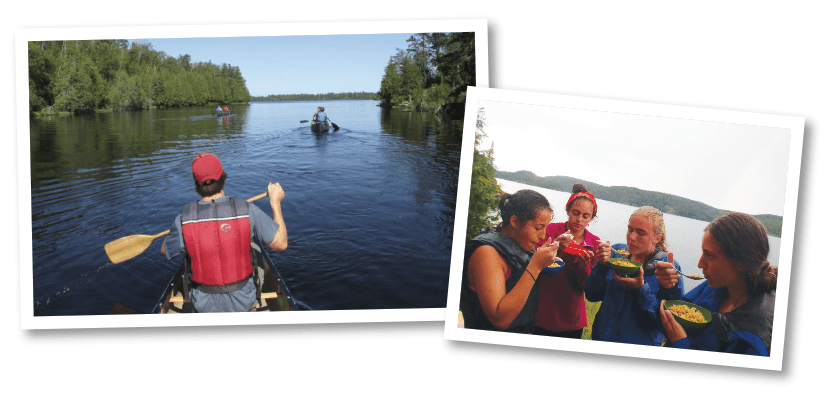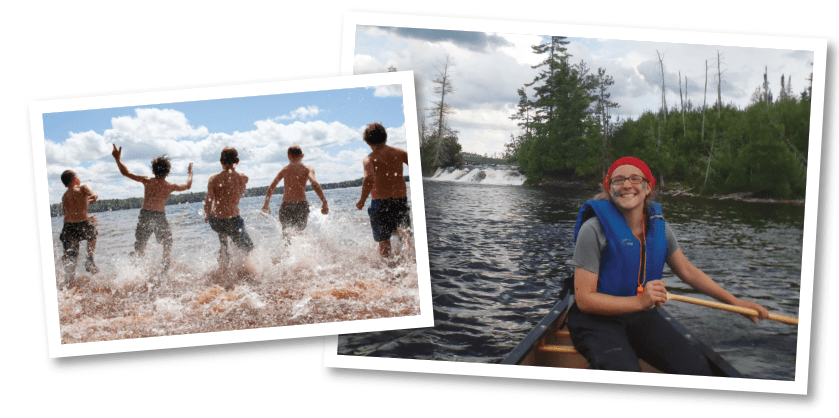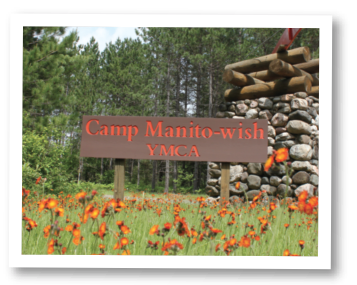By Alissa Johnson
When a group of campers from Camp Manito-wish YMCA approaches its first campsite in the Boundary Waters Canoe Area Wilderness or Quetico Provincial Park, the counselors ask the group to pause on the water. They’ll float in their canoes and talk through everything that’s going to happen on land: how they’ll unload the canoes, who will set up the tents, and who will gather firewood. It’s a way to set expectations, but it’s also a key part of the Manito-wish philosophy to transfer leadership from counselor to camper.
“When I talk to potential staff or campers, and hone in on what makes our program different, it is our intentionality with our leadership program,” says Ryan Wagner, Wilderness Program Director at Manito-wish. “It’s all about transfer of leadership between the leaders and the participants, and we focus on that whether the kids are 10 or 18. It’s unique, and it’s intentional.”

Of course, that transfer of leadership looks different for a 10-year-old than it does it does for a 17-year-old. Wagner explained that counselors coach 10-year-olds through everything that happens during the first couple of days on trail. Gradually, however, a group will require less coaching until everyone can land at a campsite and know what to do without being told. By contrast, older campers will take on specific leadership roles, acting as co-leader for the day, checking maps, cooking meals and making sure the group stays together while they paddle. But at both ends of the spectrum it’s all about leadership, and that’s true for all of the Manito-wish programs.
The only YMCA camp that also functions as its own branch, Manito-wish serves 2,500 to 3,000 kids a year from its camp in Boulder Junction, Wisconsin: 250 of those kids go through their Outpost Program (the wilderness tripping program), roughly 800 participate in the Residential Camp Program, and 1,500 participate in the Leadership Program, through which Manito-wish staff often take the camp experience to them, putting on programming at schools. And while the trips get progressively longer and more remote, campers aren’t required to follow a specific progression when they get started in the Outpost program.
“If there is a progression, it’s through the Summer Camp Program and into the Outpost Program,” Wagner said. But up until the age of 15, they can join many of the wilderness trips without being interviewed and without being tracked (advanced and expeditionary trips that travel to Canada and Alaska do require a certain level of experience at Manito-wish). All 10-year-olds start with canoeing, but as they get older they can choose from backpacking and kayaking, too. They’re also free to switch from one to the other. Between the ages of 14 and 16, canoeing groups start heading to the BWCAW and eventually Quetico, continuing a long-time Manito-wish tradition. The Canuck Trip, an advanced, month-long trip for juniors and seniors that now heads to Saskatchewan, got its start in Quetico (legend has it that environmental writer Sigurd Olsen outfitted those Manito-wish groups, and the names of early Canuck leaders still adorn the camp’s canoes).

Right: Canoeing through the wilds of northern Saskatchewan, Canada. All photos courtesy Camp Manito-wish YMCA.
Today, the Boundary Waters and Quetico continue to embody the camp’s leadership and wilderness philosophies. “Our model is to get kids into the wilderness and away from the distractions of everyday life,” Wagner says. “When we take kids to the wilderness, we take kids two steps back from everyday life. They get to camp here and we take away cell phones and computers and things like iPods, but they still have bathroom amenities and warm meals cooked for them. We put them in the wilderness, and it’s one more step back.”
Freed from distractions, campers can delve into the wilderness experience and truly grow as individuals in a safe and supportive group. Wagner explained that one of the camp’s mottos is ‘Try it. Change it. Try again.’ Kids don’t have to succeed at something on the first try. They can make a mistake, reassess the situation, change their approach, and try again—all with the support of their counselors and fellow campers.
“The Boundary Waters and Quetico play right into that,” Wagner says. “There’s not a pontoon boat, there are no motors for the most part. They’re not hearing motors crank up and fisherman flying around trying to hit the hot spots. Kids can delve into the experience without distractions.”
The ‘Try it. Change it. Try again.’ motto is yet another facet of Manito-wish’s focus on leadership, exemplifying many of the core attributes that Mantio-wish has identified as essential to leadership: humility, adaptability, and resourcefulness, among others. Certainly attributes essential in life.
To learn more about Camp Manito-wish YMCA and the ways it can teach your child the attributes of leadership, visit www.manito-wish.org.
This article appeared in the Summer 2013 edition of Wilderness News


